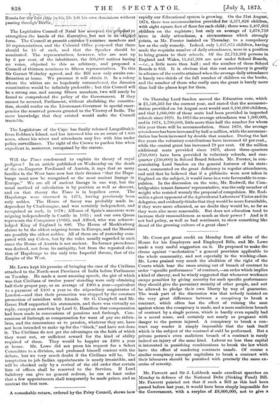On Thursday Lord Sandon moved the Education vote, which is
£1,548,563 for the current year, and stated that the accommo- dation provided on 1st August next would seat 3,100,000 children, and that 1,000,000 of these seats had been provided in inspected schools since 1870. In 1873 the average attendance was 1,500,000, and in 1874, 1,700,000, little more thin half the number for whom this year there will be accommodation. Since 1870, the average attendance has been increased by half-a-million, while the accommo- dation has been increased by double that number. During the last five years the voluntary contributions have increased 43 per cent., while the central grant has increased 79 per cent. Of the million additional seats provided since 1870, about three-quarters (750,000) have been provided in voluntary school); and one- quarter (250,000) in School Board Schools. Mr. Forster, in con- gratulating Lord Sandon on the general features of his state- ment, commented on the great deficiency in regular attendances, and said that he believed that if a plebiscite were now taken in England on the subject, it would issue in a vote favourable to com- pulsion. In the discussion on the vote, Mr. Rodwell, the Cam- bridgeshire tenant-farmers' representative, was the only member of weight who resisted warmly the proposal of compulsion. Mr. Rod- well is a great opponent of the Agricultural Labourers' Union and its delegates, and evidently thinks that they would be more formidable, if they were more educated, as no doubt they would be, so far as they were also more reasonable. But does not education tend to increase their reasonableness as much as their power ? And is it not bad policy, as well as bad sentiment, to show something like dread of the growing culture of a great class?


































 Previous page
Previous page